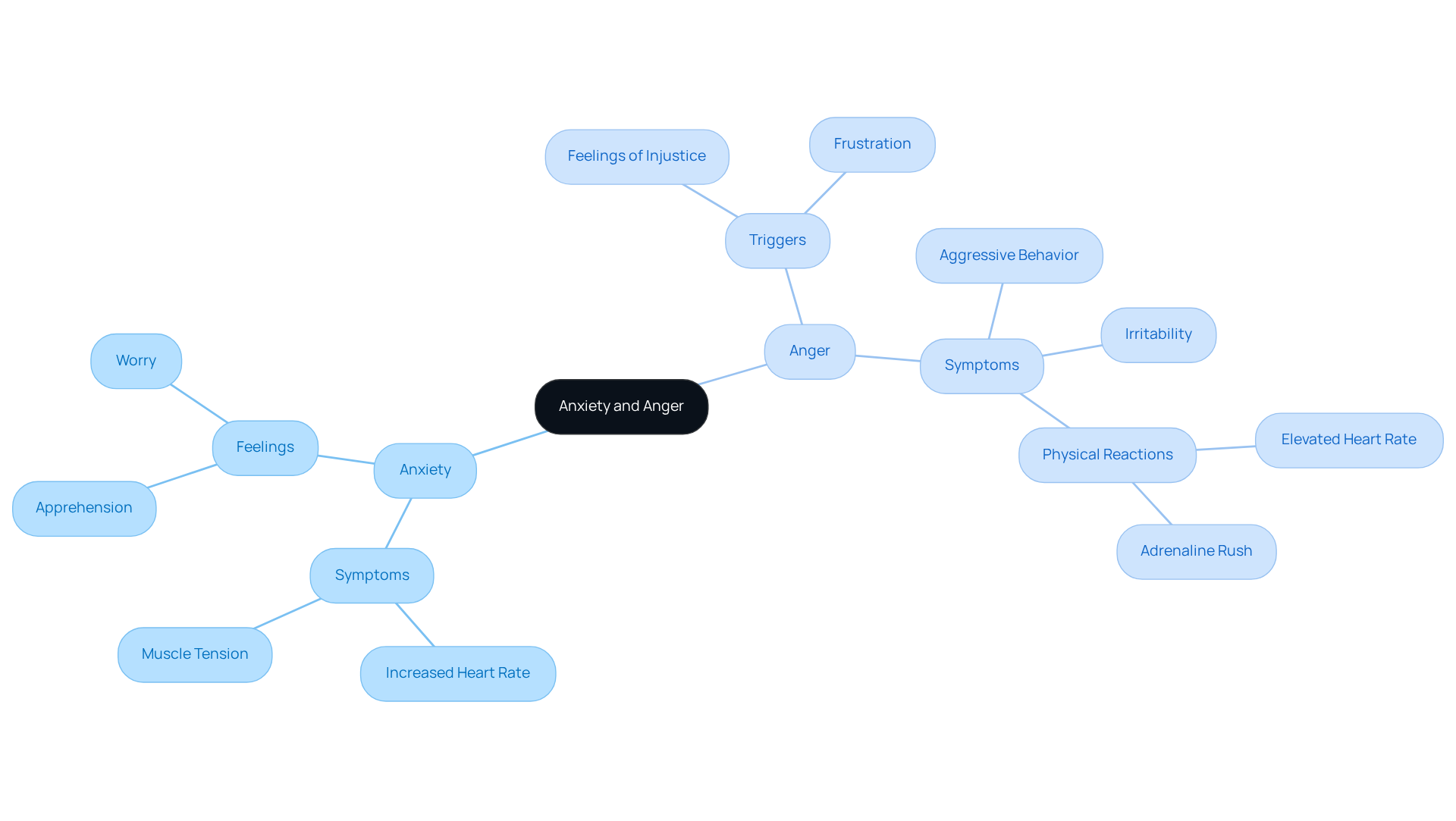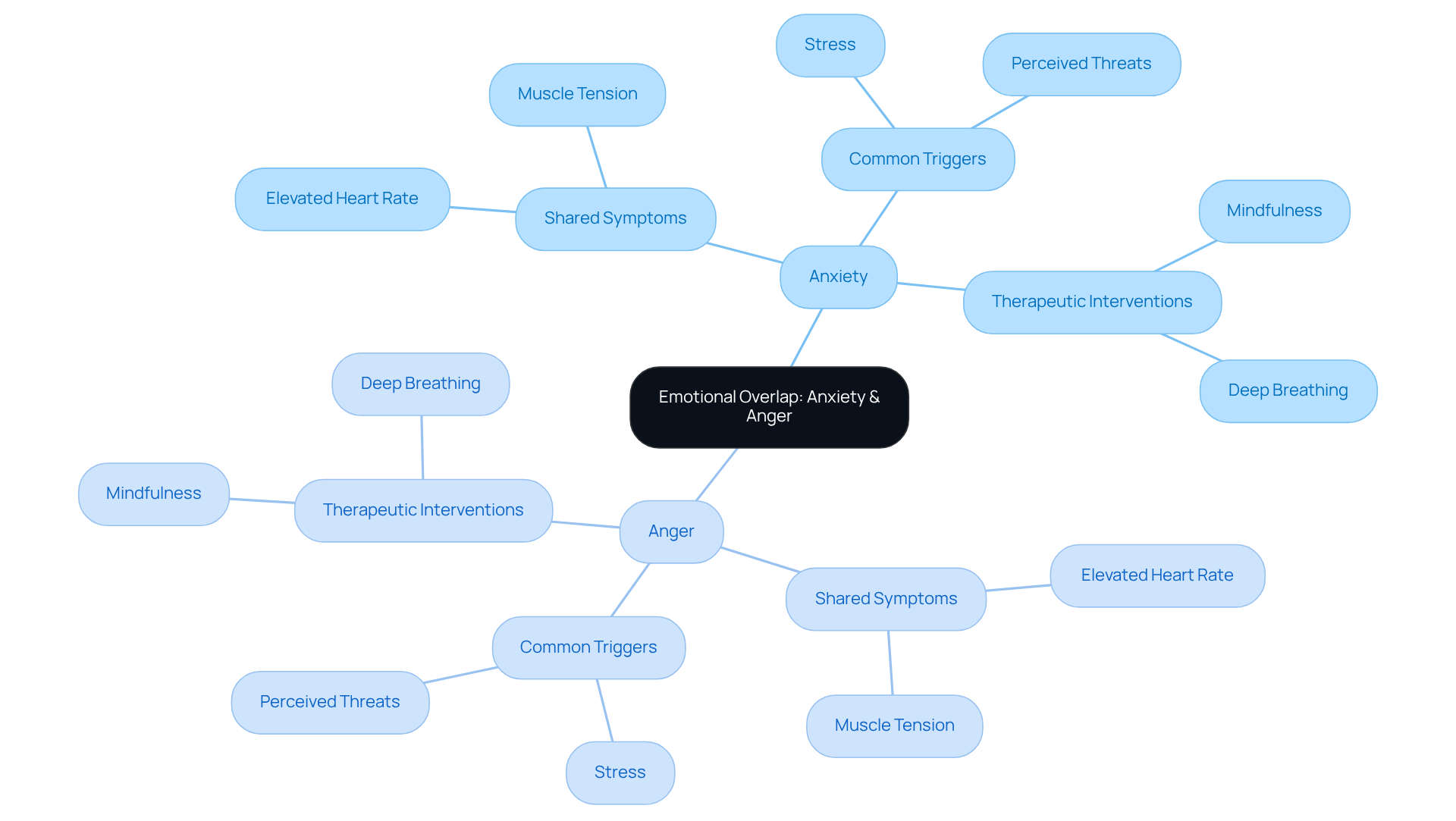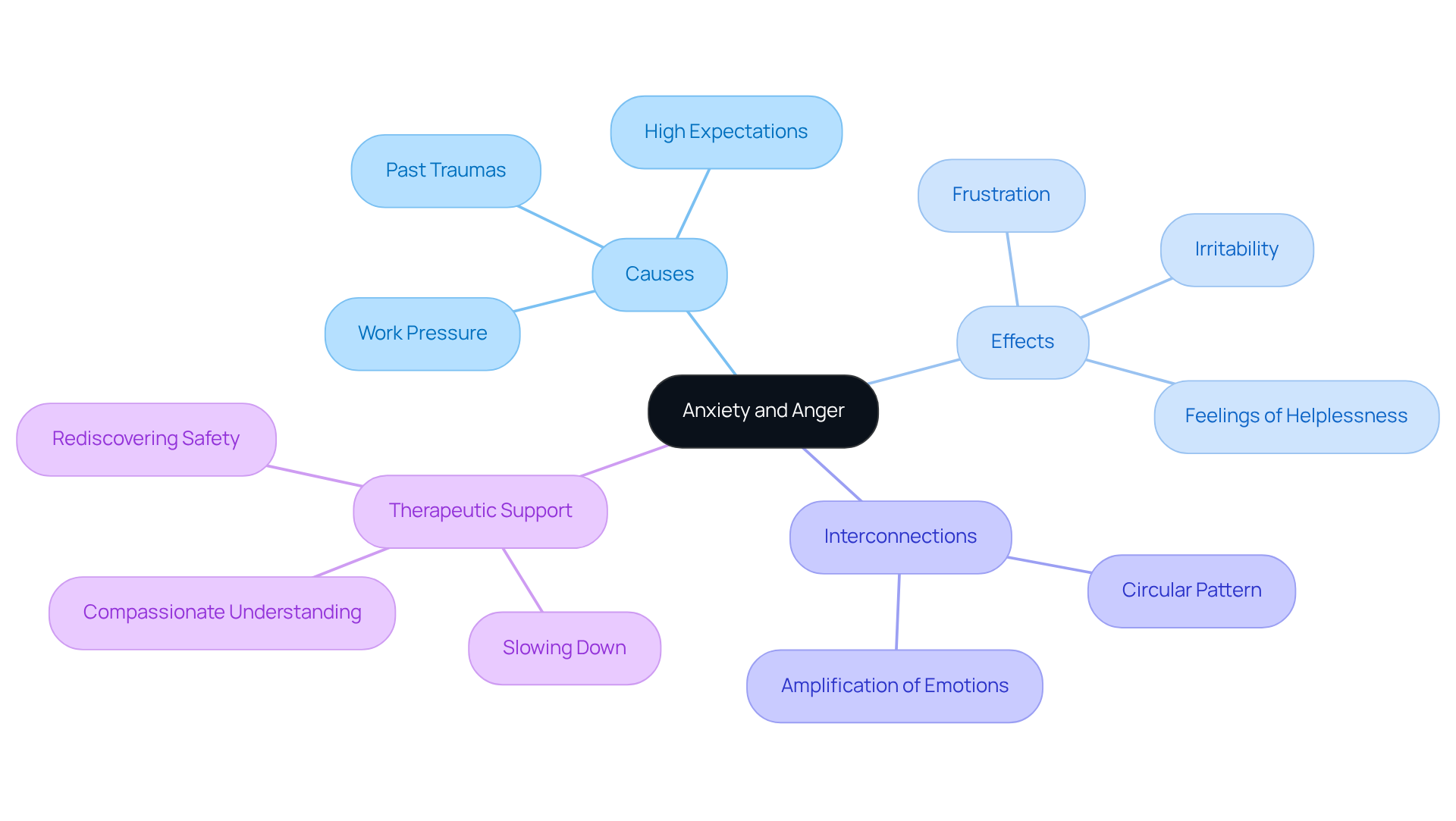Overview
Anxiety and anger are deeply interconnected emotional responses that often emerge from stress and perceived threats. These feelings can manifest physically, causing symptoms such as an increased heart rate and muscle tension. Have you ever felt overwhelmed by these emotions? You're not alone. This article explores compassionate strategies for managing anxiety and anger together, highlighting the importance of:
- Mindfulness
- Physical activity
- Professional support
By fostering emotional balance and resilience, we can navigate these challenges more effectively. As we explore this further, consider how these approaches might resonate with your own experiences. Seeking help is a courageous step towards healing, and it's essential to remember that support is available to guide you on this journey.
Introduction
Anxiety and anger are deeply intertwined emotions, creating a whirlwind of stress and discomfort that can leave individuals feeling overwhelmed and powerless. It is essential to understand these complex feelings, as they impact not only mental health but also manifest physically, leading to symptoms such as increased heart rates and muscle tension.
Have you ever felt caught in this emotional storm? This article gently explores the core concepts of anxiety and anger, illuminating their similarities and interconnections. By offering practical strategies for managing these emotions together, we aim to pave the way for a more balanced and peaceful life. Together, let’s navigate this emotional landscape.
Define Anxiety and Anger: Core Concepts
Anxiety and anger often create a sense of apprehension, worry, and fear about what lies ahead. This emotional state can manifest physically, with symptoms like an increased heart rate and muscle tension. It's our body's natural response to perceived threats or stressors, leading us into a heightened state of alertness. Have you ever felt this way, as if something looming is just around the corner?
On the other hand, rage emerges as a powerful emotional response to feelings of injustice or frustration, which can also lead to anxiety and anger. It can lead to aggressive behavior or irritability, and like anxiety, it can also trigger physical reactions such as an elevated heart rate and adrenaline rush. As we explore this further, it’s essential to recognize how anxiety and anger can influence one another and impact our overall mental health.
Understanding these core concepts is vital for our . By acknowledging the feelings of anxiety and anger, we can begin to address them compassionately. If you find yourself overwhelmed by these emotions, seeking support can be a significant step towards finding peace and balance in your life.

Explore the Similarities: Emotional Overlap
Anxiety and anger share significant emotional and physiological similarities, often arising as responses to stress and perceived threats. Have you ever noticed how both feelings can trigger , such as an elevated heart rate and muscle tension? If left unmanaged, these reactions can lead to impulsive behaviors. For high achievers, who frequently struggle to prioritize their own needs and may feel overwhelmed, these emotions can become particularly pronounced. When faced with stress, it’s common to feel irritable or angry, especially while juggling multiple responsibilities. highlights the importance of recognizing and addressing both anxiety and anger together, particularly for those navigating the challenges of trauma and burnout.
Therapeutic interventions, such as those provided at The Emerald Couch, often emphasize the connection to anxiety and anger. Clients are encouraged to identify their emotional states on a ten-point scale, checking in with themselves when they reach a score of three or four, which indicates feelings of worry and irritability. Techniques like mindfulness, deep breathing, and engaging in distracting activities can be incredibly helpful in managing these emotions. By fostering self-awareness and emotional control, individuals can navigate the complexities of stress and frustration more effectively. This journey ultimately leads to healthier emotional responses and a greater sense of security in their lives.
As we explore these feelings further, remember that seeking support is a courageous step towards healing. You are not alone in this journey; many have found solace and strength through therapy. The path to emotional well-being begins with understanding and addressing your feelings, and there are compassionate professionals ready to help guide you along the way.

Examine Interconnections: How Anxiety Fuels Anger and Vice Versa
The connection between stress and frustration often forms a circular pattern, particularly for high achievers who may find it challenging to prioritize their own needs. Have you ever felt overwhelmed by the demands placed upon you? Anxiety and anger can lead to feelings of frustration and helplessness. For instance, when facing the pressure of a work deadline, one might become irritable and lash out at colleagues, feeling weighed down by the expectations to perform.
Conversely, unresolved anger can amplify anxiety and anger, as individuals might worry about the repercussions of their feelings or feel guilt over their reactions. It’s essential to recognize these interconnections, especially for those who may feel burdened by past traumas that can manifest as anxiety and anger. At The Emerald Couch, we are here to support you in slowing down and becoming more present. Together, we can , helping you to rediscover safety within your body and your life. Seeking therapy can be a vital step towards healing, allowing you to address these feelings with compassion and understanding.

Implement Strategies: Managing Anxiety and Anger Together
To effectively manage anxiety and anger together, consider embracing the following compassionate strategies:
- Mindfulness and Relaxation Techniques: Have you ever found solace in mindfulness practices like meditation or deep breathing exercises? Engaging in these activities can calm both your mind and body, alleviating the physiological symptoms of stress and frustration.
- Physical Activity: Imagine the relief that regular exercise can bring. Activities such as jogging, yoga, or even a brisk walk can help release built-up tension and uplift your mood, creating a sense of balance in your emotional landscape.
- : Reflect on the thoughts that may be contributing to your distress. Challenging harmful thought patterns through cognitive restructuring can empower you to reframe your responses to stressors, fostering a more positive mindset.
- Communication Skills: How do you express your feelings? Practicing assertive communication can help you articulate your emotions without aggression. Utilizing 'I' statements allows you to share your feelings in a way that doesn’t escalate disputes but rather fosters understanding.
- Seek Professional Support: Have you considered the benefits of working with a therapist? At The Emerald Couch, you can receive tailored strategies and support to navigate stress and frustration effectively. During your intake session, you will collaboratively develop a custom treatment plan that addresses your unique needs and goals, defining what success looks like for you. Therapy can be a safe space for exploring the root causes of your emotions and developing coping mechanisms that resonate with your journey.
By implementing these strategies, you can work towards achieving a healthier emotional balance and mitigating the effects of anxiety and anger in your life. Remember, seeking help is a courageous step towards healing.
Conclusion
Understanding the intricate relationship between anxiety and anger is essential for nurturing emotional well-being. These two emotions, while distinct, often intertwine, leading to increased stress and potential behavioral challenges. Have you ever felt overwhelmed by your emotions? By recognizing their shared physiological responses and triggers, you can take proactive steps toward managing these feelings more effectively.
As we explore anxiety and anger, we uncover their significant overlap, particularly in how they manifest both physically and emotionally. Strategies such as:
- mindfulness
- physical activity
- cognitive behavioral techniques
- effective communication
can empower you to regain control over your emotional responses. Seeking professional support can further enhance this journey, providing tailored guidance and coping mechanisms to navigate these complex feelings.
Ultimately, acknowledging and addressing anxiety and anger is a vital part of achieving emotional balance. By implementing compassionate strategies and seeking help, you can transform your experiences, fostering resilience and a deeper understanding of your emotional landscape. Embracing this journey not only leads to personal growth but also cultivates a healthier and more fulfilling life.
Frequently Asked Questions
What are the core concepts of anxiety and anger?
Anxiety and anger are emotional states characterized by feelings of apprehension, worry, and fear about the future. They can manifest physically with symptoms such as increased heart rate and muscle tension, which are natural responses to perceived threats or stressors.
How does rage relate to anxiety and anger?
Rage is a powerful emotional response to feelings of injustice or frustration, which can lead to both anxiety and anger. It may result in aggressive behavior or irritability and can also trigger physical reactions like an elevated heart rate and adrenaline rush.
How do anxiety and anger influence each other?
Anxiety and anger can influence one another and impact overall mental health, creating a cycle where one emotion may exacerbate the other.
Why is it important to understand anxiety and anger?
Understanding anxiety and anger is vital for healing. By acknowledging these feelings, individuals can begin to address them compassionately and work towards finding peace and balance in their lives.
What should someone do if they feel overwhelmed by anxiety and anger?
If someone feels overwhelmed by anxiety and anger, seeking support can be a significant step towards managing these emotions and finding peace.




